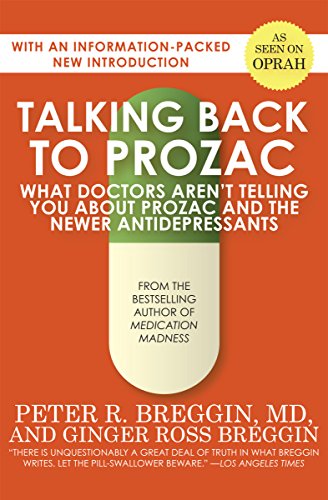Talking Back to Prozac
What Doctors Aren't Telling You About Prozac and the Newer Antidepressants
Peter R. Breggin; Ginger Ross Breggin
BOOK REVIEW

In a world where mental health is often reduced to prescriptions and algorithms, Talking Back to Prozac: What Doctors Aren't Telling You About Prozac and the Newer Antidepressants serves as a clarion call, shaking the very foundations of how we perceive psychiatric medication. Written by doctors Peter R. Breggin and Ginger Ross Breggin, this book doesn't merely critique; it ignites a firestorm of thought and reflection regarding the prevailing narrative around antidepressants. You won't just read this book; you'll wrestle with its ideas, feel your convictions challenged, and possibly even experience a revelation about the very nature of mental health treatment.
The Breggins, seasoned mental health professionals, aren't afraid to cast a wide net, pulling in both their clinical wisdom and personal encounters with patients to expose a troubling truth: many medical practitioners gloss over the darker consequences of antidepressants. Instead of offering mere statistics, they weave stories that highlight the very human toll these medications can take. From patients who felt like mere statistics in a drug trial to those who faced debilitating side effects that collide with the promise of hope, each narrative is a heartbreaking reminder that the pill-popping culture often overshadows the complexities of mental health.
Imagine this work as a raw, unfiltered diary written to the reader, punctuated by the doctors' frustrations and concerns about how the pharmaceutical industry shapes narratives, often for profit rather than patient care. You'll feel every bit of the Breggins' passion sparking through the pages - it's not just a critique; it's a heartfelt plea for more ethical and holistic approaches to treating depression and anxiety.
Some readers resonate deeply with this approach, echoing sentiments of gratitude for unveiling truths they've long felt but were unable to articulate. Others, however, push back against what they perceive to be an over-simplified narrative that demonizes medications without addressing the real struggles patients face. Critics argue that the authors fail to adequately consider the lives saved by these treatments and the undeniable difference they can make for many. Yet, isn't that the beauty of this dialogue? It forces us to wrestle with our beliefs, to reflect on the balance between clinical realities and emotional truths.
The Breggins reveal how antidepressants can wreak havoc on the very brain chemistry they aim to "fix." For decades, Prozac has been heralded as a beacon of hope, yet the authors juxtapose this optimism with terrifying accounts of withdrawal, dependency, and emotional blunting. Your stomach lurks with unease as you read about patients whom the system has failed, individuals rendered voiceless in their journey toward mental wellness.
Now, step back for a moment and consider the broader historical context. As the '90s heralded the rise of selective serotonin reuptake inhibitors (SSRIs), psychiatry experienced a seismic shift. The cultural zeitgeist embraced a "fix it with a pill" mentality, but what was brushed under the rug was the ethical conundrum of unsanctioned pharmaceutical omnipotence. Breggin's work taps into this historic oversimplification, reminding us that the human psyche is not a one-size-fits-all equation. You can't simply swallow a pill and expect life to become a seamless, sunlit path.
In the throes of the book, readers are urged to rethink the very nature of healing. The Breggins champion alternative methods, emphasizing the power of psychotherapy, community support, and lifestyle modifications. It pushes you to fervently interrogate your beliefs about mental health treatment. Can you truly embrace a holistic approach, or are you still tethered to the allure of quick-fix solutions?
As you close the last chapter of Talking Back to Prozac, a sense of urgency washes over you. This isn't just a book; it's a movement, a wake-up call to challenge the status quo. With their bold assertions, the Breggins compel each reader to take action, to demand a systemic change in mental health care, recognizing that behind every prescription is a complex, human story yearning for holistic understanding and care.
This book won't just sit on your shelf gathering dust; it will challenge your perceptions, provoke discussions at dinner parties, and make you question the healthcare narratives you've long accepted. Don't let the opportunity slip to delve into the intricate layers of mental health treatment-the stakes are too high. What you discover could reshape your understanding and influence lives far beyond your own. ✨️
📖 Talking Back to Prozac: What Doctors Aren't Telling You About Prozac and the Newer Antidepressants
✍ by Peter R. Breggin; Ginger Ross Breggin
🧾 358 pages
2014
#talking #back #prozac #what #doctors #arent #telling #about #prozac #newer #antidepressants #peter #breggin #PeterRBreggin #ginger #ross #breggin #GingerRossBreggin